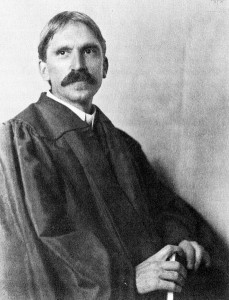As a former Buddhist of about 20 years, I still have many Buddhist friends, and one of the most frequent things I disagree with them about (I hope, amicably) is karma. Karma is a complex and tricky subject, that is often misunderstood, so I often find that when I raise objections to it, people who have studied karma and know something about it tend to jump to the conclusion that I’m in one of those categories of misunderstanding. I think otherwise. I recognise (I think) all the common misunderstandings. I recognise a whole set of reasons why some people – Buddhists, Hindus, New Agey types, or whoever – believe that a belief in karma is a good thing, but I think they’re also missing the bigger reasons why it isn’t. Instead, the practice of the Middle Way should, I think, lead us to abandon belief in karma. This is going to be a difficult subject to encapsulate in the length of a blog, but I’m going to have a go.
First, let’s acknowledge and leave behind various misunderstandings of karma. Even in its most traditionalist Indian versions, karma does not mean ‘fate’. Instead, it literally means ‘action’, and is a contraction of ‘karma-vipaka’, the ripening of action. Karma thus means the effects of action, and those effects are only believed to be inevitable once you’ve done the actions. The original significance of karmic doctrines in both Hinduism and Buddhism was thus to help people take responsibility for their actions, avoiding fatalism. It needs to be noted that ‘action’ here includes mental as well as physical actions: even a thought is an action, though often a less significant one than a physical action. The insight to be found in karma doctrine is that our actions, including mere thoughts, do always have effects of some kind. However, karmic doctrine also asserts that these effects return to us in a proportionate way.
Another confusion around karma lies between retrospective and prospective ways of looking at it. Retrospective karma is when you notice a condition (e.g. a disability) and attribute it to an action in the past (e.g. you must have done something bad in the past to get that disability). The belief in retrospective karma involves the assumption that there are no other kinds of conditions at work (other than karma), such as genetics, to produce something like a disability. This kind of belief in karma – though still common – is pretty crass. However, when I suggest that belief in karma is unhelpful, I’m not only talking about retrospective karma. The prospective view of karma, where you assume that your actions will always lead to a proportionate result for you (even when you don’t know for sure which of the conditions that affect you are due to past karma) raises quite enough problems without needing to get into the retrospective version.
In the most common Hindu view of karma, an atman, or eternal self, receives the karmic effects of your past deeds. However, in Buddhism, belief in karma is combined with the anatman or ‘no-self’ doctrine (which is often interpreted as denial of a continuous self, but may more subtly be seen as agnosticism about it). If there is no self, though, who deserves the effects of past deeds? The person who receives the karmic effect is different from the person who performs the action, and thus the idea that karma has any moral significance, or that the person who receives the effect ‘deserves’ it, falls apart. A Buddhist text called the Questions of King Milinda tries to explain this by analogy to a mango and a mango tree: the person who planted the mango, it is argued, deserves the fruits of the ensuing mango tree, even though the mango is different from the tree. But what if someone else owned the land, a third watered and fertilised the young mango tree, and a fourth made the effort to pick the fruit? At best, then, the person who planted the mango might claim a small share! After many years of thinking about this problem, I can’t see this juxtaposition of Buddhist doctrines as anything other than thoroughly contradictory. What’s more, the contradiction is not somehow indicative of deeper wisdom – it’s more likely just an ineffectual attempt to patch up the relationship between incompatible beliefs in which people had developed vested interests.
The most basic problem with karma is that it requires a perfect system of just desert. Even if you don’t know when it is coming or how, karma requires that your action today will create corresponding effects in the future. But given that we are (as the Buddhist ‘no-self’ doctrine suggests) always changing, there is no way that we could perfectly ‘deserve’ those effects of actions done by someone different in the past. We can experience all sorts of effects of previous actions, yes, but the extent to which we benefit or suffer from them is unclear and inexact. If you say something unkind to Mr Smith today, he may get his own back tomorrow. If you fill in your tax return dishonestly, you may be tortured by pangs of conscience, and the revenue may catch up with you in future. Very often, indeed, people underestimate these kinds of moral effects. But the belief that they must be inevitable and morally proportionate is just dogma: experience gives us no grounds to assert such a thing.
Of course, it is the problem of what happens to karma that hasn’t obviously had its effects within a given person’s life that leads to the doctrine of rebirth. If your karma hasn’t paid you back in this life, the argument goes, then it will do so in another. Here we very clearly go beyond anything that can be supported through experience, and into the realm of speculation and dogma. I’m not going to go further into the question of rebirth here, because without karma, there is no particular reason to take it seriously. Karma is the more basic issue, and rebirth is just a big ad hoc defence of karma in the face of just one of the many ways the doctrine is inconsistent with experience.
One of the insights related to karma, especially in the Buddhist tradition, concerns the ways in which our states of mind contribute to its workings. Indeed, on some accounts (such as that of the Yogachara school), karma is entirely a matter of stored mental effects, and the reason we experience karmic effects of our previous actions is that our deeper minds themselves store and channel those effects. Could the supposed perfection of karmic effects be explained by their mental nature? Well, neuroscience makes clear the likelihood that any given judgement can contribute to the entrenchment of a mental habit. For example, if we get into the habit of drinking too much alcohol, the prospect of alcohol creates a feedback loop in the brain, in which synaptic tracks get increasingly more entrenched. We both develop a mental model in which alcohol will meet our needs, and reward the fulfilment of that model through the dopamine hits we get from receiving it. Is the belief in karma really an ancient insight into the way our brains work?
Well, no, because there’s a big difference between an entrenched habit and an inevitable effect. The significance of an entrenched synaptic track in the brain is that it makes it much more difficult to act differently. We have to exert effort, and use more glucose, to do something different like drinking an orange juice. However, there’s nothing inevitable about the effects of that track. We could conceivably just carry on making that effort to drink orange juice instead of alcohol, and the appeal of alcohol may very gradually fade as new alternative tracks are made. The habit may well lead to me feeling the ‘karmic effect’ of the negative effects of alcohol-craving in one way or another in the future, but if we are to take responsibility for our actions we also need to accept that it may not. Uncertainty is a much more basic condition than habit and its effects, meaning that we have no justification for absolutising bad habits into karmic laws.
Perhaps recognising some of these problems, another tack that advocates of karma sometimes take is to weaken it. “Karma isn’t an iron law” they say, “Karma just means actions having consequences.” By this, I presume they mean that it is useful for people to recognise and face up to the consequences of their actions, and indeed that those consequences may well be more far reaching and profound than they recognise. If that’s what they mean, then I thoroughly agree. But why call it karma, and thus in the process associate it with what has traditionally been seen very clearly as an ‘iron law’?
OK, they can define the term ‘karma’ in any way that they wish, and the arguments for doing so, in the end, are pragmatic ones. But I’ve yet to hear a good pragmatic argument for calling the ordinary, observable effects of our actions ‘karma’, and I can offer some strong pragmatic arguments for not doing so. The main one of these is that belief in karma is overwhelmingly understood, in both Buddhist and Hindu traditions, as a purely conceptual metaphysical belief about perfect payback, and that recognising the effects of our actions needs to be raw and experiential, not purely conceptual. I learn about the effects of alcohol through raw, embodied experience, not through deduction from some absolute belief about the effects of all actions. Indeed, associating it with an absolute belief is just likely to be a distraction at best, and more likely an exercise in ad hoc defense of tradition. The consequences of our actions are overwhelmingly particular, not general. The uncertainties of that realm of particular experience are basic to it. So the belief in karma tackles the matter from the wrong end of the spectrum: encouraging us, not to reflect on our experience and generalise about it in ways that can be applied to other situations, but to impose absolute top-down assumptions on it.

